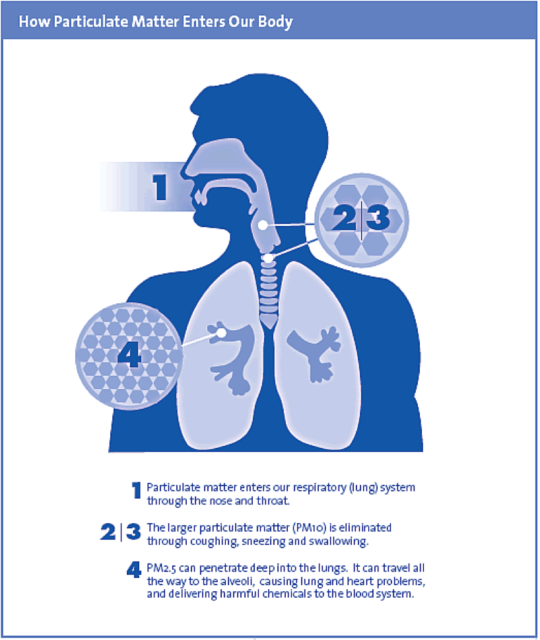
Study Reveals Major Health Threat in Your Home
- New health threat takes a back seat only to high blood pressure, poor diet, and smoking.
- Are you breathing in these cancer causers and heart attack triggers? Find out more…
- Discover one simple way to find out exactly which toxins are in your home.
Dear Living Well Daily Reader,
“Go get some fresh air…”
That’s a suggestion you may not hear much longer.
In fact, according to new research, it’s a suggestion you should probably ignore now… if you care about your health.
Not because taking a “breather” is a bad health practice.
No, taking a deep breath can have all sort of health benefits… except when it’s done in a toxic environment.
And according to a disturbing report released by the International Energy Agency (IEA) on Monday, chances are every breath you take has something bad in it.
The report shows that air pollution has become a public health catastrophe liable for the premature deaths of 6.5 million people every year.1
This means air pollution is now the fourth-largest human health threat, just after high blood pressure, poor diet, and smoking.1
But the bad news gets worse.
Without action, death by air pollution will continue to rise. By the year 2040, the estimated death toll will reach 7.5 million.
So why exactly is air pollution deadly?
![]() More Particles, More Problems
More Particles, More Problems
Many factors add to air pollution levels including, industrial manufacturing, fossil fuel-based transportation and shipping sources, and even natural occurrences like volcanic activity.
However, according to the IEA’s report, the release of harmful pollutants is mostly due to unregulated production and use of energy, which creates particulate matter (PM).
PM contains acid, dust, metal, soil particles, and mold spores, which not only create air pollution, but are also responsible for reduced visibility or haze (think smog).

Source: bcairquality.ca
Miniscule PM is particularly problematic for your heath, because these tiny particles can get deep into your lungs, and some can even enter your bloodstream.
But more importantly, PM can cause deadly health issues like heart disease, strokes, and lung cancer with long-term exposure.
Not to mention PM can also trigger devastating symptoms like heart attack, aggravated asthma, irregular heartbeat, and decreased lung function through inflammation. 3
In addition to particulate matter, volatile organic compounds ( VOCs) contribute to the health issues associated with air pollution. VOCs are released from fuels, chemicals, and solvents and evaporate into surrounding air.
VOC levels are consistently higher in indoor environments. In fact, they can be up to 10 times higher than outdoors. One reason for this is the use of chemicals, paints, adhesives, cleaners and other household products.

Source: foobot.io
VOCs including benzene and formaldehyde are linked to a range of detrimental health effects like eye, nose, and throat irritation; headaches; loss of concentration; and nausea. More serious heath endpoints include liver damage, kidney damage, central nervous system damage, and cancer.4
However, since most folks spend a majority of time indoors these days, exposure to VOCs and mold spores is likely more prevalent.
![]() Breathe Easy
Breathe Easy
Unfortunately, the only universal resolve for decreasing air pollution is to decrease energy production or at the very least, make it more efficient. And since these actions are in the hands of policymakers and energy producers, any possible improvements will be a long time coming.
But there is something you can control – your home indoor air quality.
The first step to take is to figure out exactly what level of air pollution is inside your home.
You can do this with a home air test.
The most comprehensive home air tests use a sampling pump to collect air from your home and then a lab for analysis. I recommend using Home Air Check.
They will mail you a pump and test kit. Once you mail it back in, they will analyze your sample and send you the results and a detailed report of likely sources of VOCs in your home.
This easy-to-read report will also include targeted advice for improving your indoor air quality.
In addition, Home Air Check uses a lab accredited by the American Industrial Hygiene Association. This accreditation takes months to complete and ensures the lab is fully competent in conducting air quality testing.
Click here to discover more about Home Air Check.
We are using Home Air Check to find out what’s in the air here at the Living Well HQ. We will share the results with you as soon as we get them in. Stay tuned for that!
Live well,

Natalie Moore
Managing editor, Living Well Daily
P.S. Do you currently use an air filtration system? If so, what kind? Let me know!
nmoore@lfb.org
Sources
[1] Energy and Air Pollution 2016 – World Energy Outlook Special Report
[4] Volatile Organic Compounds (VOCs)
Written By Natalie Moore
Natalie Moore is a dedicated health researcher with a passion for finding healthy, natural, and science-based solutions. After a decade of direct healthcare experience in western and natural medicine, she was involved in public health research before joining Living Well Daily.
View More Free Articles
This Sleep Mistake Is Doubling Your Disease Risk
Think your inconsistent bedtime is just a harmless habit? Think again. New research reveals that going to bed at different times each night isn’t just making you tired—it could be dramatically increasing your risk of serious diseases. But the key to making sure poor sleep doesn’t derail your health goals likely isn’t what you think…....
Stop Obsessing Over Diet Trends
Can we stop with the endless diet debates already? Every other week there’s a new headline shouting about which diet is best for weight loss, heart health, or diabetes. Paleo, keto, low-carb, high-protein… it’s exhausting. And now, a new meta-analysis is out comparing the Mediterranean diet, the DASH diet, and something called AHEI (that’s “Alternative...
A New Reason to Ditch Processed Junk
If you’ve ever walked the inside aisles of your local grocery store and thought, “This is all just junk,” your instincts were spot on. A new study published in the journal Thorax just added another red flag to the list of dangers linked to ultra-processed food—a 41 percent higher risk of lung cancer. That’s right....
When Being Winded on Stairs Is Serious (And When It Isn’t)
I had an athlete visit me recently because he experienced shortness of breath while climbing stairs. He is in great shape, so he was worried about what it might mean. “Doc,” he said, “I run five miles three times a week. Why am I huffing and puffing after two flights of stairs?” His concern is...
Study EXPOSES Hidden Danger Lurking in Your Car
We think of our homes and cars as safe havens. But according to a startling new study, they may be flooding your lungs with microscopic plastic particles—every single day. Researchers in France recently found that adults inhale an average of 68,000 microplastic particles daily from indoor air alone. To put that in perspective, that’s about...
Mailbag: Is Modern Food Making You Snore?
“What can cause snoring, and is there a way to correct this issue?” —Seeking Silence Hi Seeking, Snoring happens when the soft tissues in your throat relax and vibrate as air passes through during sleep. While several factors can cause snoring—from sleep position to nasal congestion—I want to share one trigger that might surprise you....
Simple Food Swap SLASHES Dementia Risk 28%
Let’s be honest… who would jump at the chance to cut their dementia risk by 28 percent. And no, you don’t need to run marathons, survive on broccoli, or learn to play the zither (whatever that is) to make it happen. All it takes is one easy swap—something that’s probably already in your refrigerator. Researchers...
This SMART Floss Exposes Hidden Health Danger
Scientists have created dental floss that doesn’t just clean between your teeth—it also tracks your stress while you’re flossing. Now, I know what you’re thinking… “Great—now even flossing is going to stress me out by telling me how stressed I am.” But this fascinating new tool from Tufts University could be a game-changer for understanding...
Is This "Safe" Sweetener Damaging Your Brain?
The headlines are alarming… “Popular Sugar Substitute Linked to Brain Cell Damage” and “Erythritol Could Damage Critical Brain Barrier” are just two of the dozens I’ve spotted recently. But before you toss every sugar-free product in your pantry, let’s take a closer look at what this study actually shows—and what it doesn’t. The latest research...
This Summer Threat Could SPIKE Your Blood Sugar
Picture this… It’s another scorching hot summer day. You crank up the air conditioning while watching the weather forecast, which predicts yet another “record-breaking” heat wave. It’s starting to feel like just another miserably uncomfortable summer. But what you might not realize is that—if you have diabetes—those rising temps could do far more damage to...









